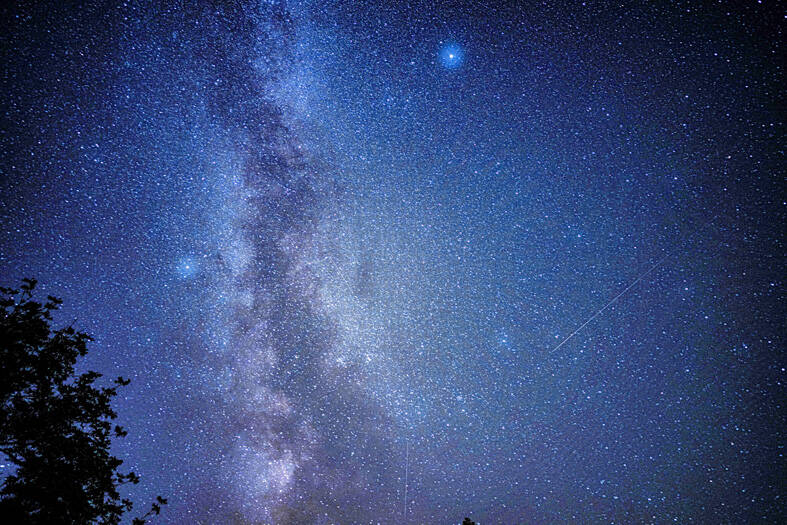Some time before September, a massive explosion 3,000 light years from Earth is to flare up in the night sky, giving amateur astronomers a once-in-a-lifetime chance to witness this space oddity.
The binary star system in the constellation Corona Borealis — “northern crown” — is normally too dim to see with the naked eye.
Every 80 years or so, exchanges between its two stars, which are locked in a deadly embrace, spark a runaway nuclear explosion. The light from the blast travels through the cosmos and makes it appear as if a new star — as bright as the North Star, according to NASA — has suddenly popped up into the night sky for a few days.

Photo: AFP
It would be at least the third time that humans have witnessed this event, which was first discovered by Irish polymath John Birmingham in 1866, then reappeared in 1946.
The appropriately named Sumner Starrfield, an astronomer at Arizona State University, said that he was excited to see the nova’s “outburst.”
After all, he has worked on T Coronae Borealis — also known as the “Blaze Star” — on and off since the 1960s.
Starrfield is rushing to finish a scientific paper predicting what astronomers will find out about the recurring nova whenever it shows up in the next five months.
“I could be today ... but I hope it’s not,” he said with a laugh.
There are only about 10 recurring novas in the Milky Way and surrounding galaxies, Starrfield said.
Normal novas explode “maybe every 100,000 years,” but recurrent novas repeat their outbursts on a human timeline because of a peculiar relationship between their two stars, he said.
One is a cool dying star called a red giant, which has burnt through its hydrogen and has hugely expanded — a fate that is awaiting our own sun in about 5 billion years.
The other is a white dwarf, a later stage in the death of a star, after all the atmosphere has blown away and only the incredibly dense core remains.
Their size disparity is so huge that it takes T Coronae Borealis’ white dwarf 227 days to orbit its red giant, Starrfield said.
The two are so close that matter being ejected by the red giant collects near the surface of the white dwarf.
Once the mass roughly of Earth has built up on the white dwarf — which takes about 80 years — it heats up enough to start a runaway thermonuclear reaction, Starrfield said.
This ends up in a “big explosion and within a few seconds the temperature goes up 100-200 million degrees” Celsius, said Joachim Krautter, a retired German astronomer who has studied the nova.
The James Webb Space Telescope would be just one of the many eyes that turn toward the outburst of T Coronae Borealis once it begins, Krautter said.
However, you do not need such advanced technology to witness this rare event — whenever it might happen.
“You simply have to go out and look in the direction of the Corona Borealis,” Krautter said.
Some lucky sky gazers are already preparing for the year’s biggest astronomic event tomorrow, when a rare total solar eclipse is to occur across a strip of the US.

MONEY GRAB: People were rushing to collect bills scattered on the ground after the plane transporting money crashed, which an official said hindered rescue efforts A cargo plane carrying money on Friday crashed near Bolivia’s capital, damaging about a dozen vehicles on highway, scattering bills on the ground and leaving at least 15 people dead and others injured, an official said. Bolivian Minister of Defense Marcelo Salinas said the Hercules C-130 plane was transporting newly printed Bolivian currency when it “landed and veered off the runway” at an airport in El Alto, a city adjacent to La Paz, before ending up in a nearby field. Firefighters managed to put out the flames that engulfed the aircraft. Fire chief Pavel Tovar said at least 15 people died, but

South Korea would soon no longer be one of the few countries where Google Maps does not work properly, after its security-conscious government reversed a two-decade stance to approve the export of high-precision map data to overseas servers. The approval was made “on the condition that strict security requirements are met,” the South Korean Ministry of Land, Infrastructure and Transport said. Those conditions include blurring military and other sensitive security-related facilities, as well as restricting longitude and latitude coordinates for South Korean territory on products such as Google Maps and Google Earth, it said. The decision is expected to hurt Naver and Kakao

LIKE FATHER, LIKE DAUGHTER: By showing Ju-ae’s ability to handle a weapon, the photos ‘suggest she is indeed receiving training as a successor,’ an academic said North Korea on Saturday released a rare image of leader Kim Jong-un’s teenage daughter firing a rifle at a shooting range, adding to speculation that she is being groomed as his successor. Kim’s daughter, Ju-ae, has long been seen as the next in line to rule the secretive, nuclear-armed state, and took part in a string of recent high-profile outings, including last week’s military parade marking the closing stages of North Korea’s key party congress. Pyongyang’s official Korean Central News Agency (KCNA) released a photo of Ju-ae shooting a rifle at an outdoor shooting range, peering through a rifle scope

Australian Prime Minister Anthony Albanese yesterday said he did not take his security for granted, after he was evacuated from his residence for several hours following a bomb threat sent to a Chinese dance group. Albanese was evacuated from his Canberra residence late on Tuesday following the threat, and returned a few hours later after nothing suspicious was found. The bomb scare was among several e-mails threatening Albanese sent to a representative of Shen Yun, a classical Chinese dance troupe banned in China that is due to perform in Australia this month, a spokesperson for the group said in a statement. The e-mail